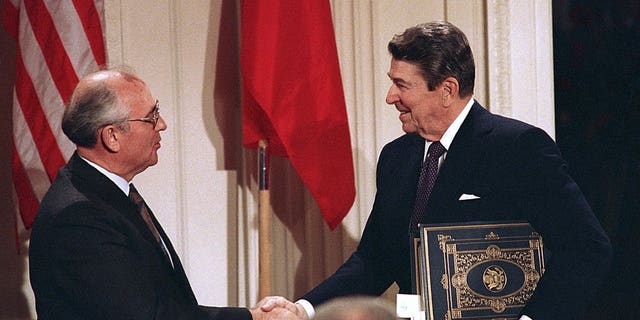A
historic arms-control treaty signed three decades ago by President
Ronald Reagan and Soviet leader Mikhail Gorbachev was scrapped after
President Trump decided to withdraw Friday.
The move to scrap the Intermediate-range Nuclear Forces (INF) treaty comes amid the administration’s assessment that
Russia was
in “material breach of the treaty” and made no effort to “come back
into compliance” with the agreement, a senior White House official said.
This undated file photo provided Tuesday, Sept. 19, 2017, by
Russian Defense Ministry official web site shows a Russian Iskander-K
missile launched during a military exercise at a training ground at the
Luzhsky Range, near St. Petersburg, Russia. (Associated Press)
Russia was given a six-month period, in accordance
with the treaty, as a “final opportunity to come back into compliance”
with the agreement, but the government headed by President Vladimir
Putin “has made no efforts to do that,” the official added.
The
end of the treaty sparks of a new global arms race between the two
countries, which possess the world's largest nuclear arsenals.
The
Trump administration stressed it was Russia’s fault the treaty came to
an end, pointing out that Moscow has been developing and fielding
weapons that violate the treaty and threaten the U.S. and its allies,
particularly in Europe.
“Russia alone is to blame for this
situation,” the senior official said. “We have taken every opportunity
-- dozens and dozens of opportunities across two administrations – to
bring Russia back into compliance.”
“Russia alone is
to blame for this situation. We have taken every opportunity -- dozens
and dozens of opportunities across two administrations – to bring Russia
back into compliance.”
— A senior administration official
“It
is clear that they are in material breach of the INF Treaty, which is,
of course, not its only arms control violation. They are a serial
violator of arms control agreements,” the official added, noting that
“This violation, however, represents a direct security threat to the
United States and our allies.”
The U.S. has long complained that
the treaty was no longer fair and actually doesn’t stop the arms race as
intended as Russia was openly violating it, while China, which is a
non-signatory, is free develop weapons that would otherwise be
prohibited.
President Ronald Reagan, right, shakes hands with Soviet leader
Mikhail Gorbachev after the two leaders signed the Intermediate-Range
Nuclear Forces (INF) Treaty to eliminate intermediate-range missiles
during a ceremony in the White House East Room in Washington, Dec. 8,
1987. (Associated Press)
The Trump administration said, for example, Russia
has produced and fielded multiple battalions of the 9M729
ground-launched cruise missile throughout Russia, which is a violation
of the treaty. Some of the missiles have “the ability to strike critical
European targets.”
“This violation, which has been underway for
many years, is a critical threat to American and Allied security now.
That is why this action has become unavoidable,” a senior official said.
Another
White House official pointed out that Russia has been deceptive about
its military buildup, particularly denying the development of a
ground-launched cruise missile in 2014 that is now fielded and poses a
security risk to Europe.
“Throughout
the process, they lied about the existence of the missiles at both the
expert level and, finally when confronted with the evidence, came clean
for this in the past several months,” the official said.
European
powers came out to criticize Russia for not complying with the INF
treaty amid the U.S. announcement of withdrawing from the agreement.
“We
regret the fact that Russia has not done what was necessary to save the
INF treaty,” German Foreign Minister Heiko Maas said.
“Now we
call all the more on Russia and the U.S. to preserve the New START
treaty as a cornerstone of worldwide arms control,” he added. “Nuclear
powers such as China must also face up to their responsibility on arms
control — they have more weight in the world than at the time of the
Cold War.”
“We regret the fact that Russia has not done what was necessary to save the INF treaty.”
— German Foreign Minister Heiko Maas.
Both
the U.S. and Russia will have to decide whether to extend or replace
the larger New START treaty when it expires in early 2021, a treaty that
imposed limits starting in 2018 on the number of U.S. and Russian
long-range nuclear warheads and launchers.
Trump hasn’t committed
to extending the treaty and even once calling it as “just another bad
deal” concocted by the predecessor, the Obama administration.
The
1987 INF treaty was responsible for the elimination of 2,692 U.S. and
Soviet Union nuclear and conventional ground-launched ballistic and
cruise missiles. The treaty also banned land-based missiles with a range
between 500 and 5,500 kilometers (310 to 3,410 miles).
Fox News' John Roberts and The Associated Press contributed to this report.



















